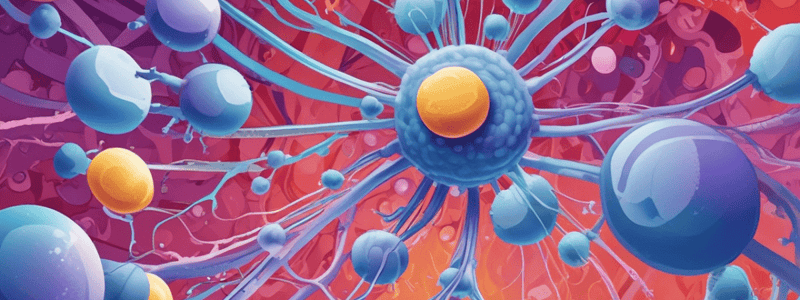Podcast
Questions and Answers
What is the role of the immune system in preventing cancer, and how does immunodeficiency increase cancer risk?
What is the role of the immune system in preventing cancer, and how does immunodeficiency increase cancer risk?
The immune system plays a crucial role in preventing cancer through immune surveillance. People with immunodeficiency, such as those with HIV or organ transplant recipients treated with immunosuppressive drugs, have an increased risk of cancer development due to their weakened immune system.
How do cancer cells avoid immune attack, and what is the significance of MHC class I molecules in this process?
How do cancer cells avoid immune attack, and what is the significance of MHC class I molecules in this process?
Cancer cells avoid immune attack by down-regulating MHC class I molecules, which reduces antigen presentation to CD8+ cytotoxic T cells. This allows cancer cells to evade recognition by the immune system.
What is the significance of antigenic modulation in cancer cells, and how does it contribute to immune evasion?
What is the significance of antigenic modulation in cancer cells, and how does it contribute to immune evasion?
Antigenic modulation refers to the lack of immunogenic antigens expressed on cancer cells, making them less recognizable by the immune system. This allows cancer cells to evade immune attack.
What is the role of fibroblasts in creating a physical barrier against immune cells in tumors?
What is the role of fibroblasts in creating a physical barrier against immune cells in tumors?
What is adoptive cellular therapy, and how does it differ from traditional cancer immunotherapy strategies?
What is adoptive cellular therapy, and how does it differ from traditional cancer immunotherapy strategies?
What are LEUKAEMIAS AND LYMPHOMAS, and what are the common causes of these cancers?
What are LEUKAEMIAS AND LYMPHOMAS, and what are the common causes of these cancers?
What is the mechanism of immune checkpoint blockade in cancer immunotherapy?
What is the mechanism of immune checkpoint blockade in cancer immunotherapy?
What is the purpose of adoptive cellular therapy in cancer treatment?
What is the purpose of adoptive cellular therapy in cancer treatment?
What is the most common type of leukaemia in Australia?
What is the most common type of leukaemia in Australia?
What is the primary function of indoleamine 2,3-dioxygenase (IDO) in cancer cells?
What is the primary function of indoleamine 2,3-dioxygenase (IDO) in cancer cells?
What is the main difference between leukaemia and lymphoma?
What is the main difference between leukaemia and lymphoma?
What is the primary target of chimeric antigen receptor T cells (CAR T cells) in adoptive cellular therapy?
What is the primary target of chimeric antigen receptor T cells (CAR T cells) in adoptive cellular therapy?
What is the purpose of washing the gel extensively in the process of identifying antibodies?
What is the purpose of washing the gel extensively in the process of identifying antibodies?
What type of malignancy is characterized by a narrow band or 'M protein' on electrophoresis of serum proteins?
What type of malignancy is characterized by a narrow band or 'M protein' on electrophoresis of serum proteins?
Why are B cell malignancies more common than T cell malignancies?
Why are B cell malignancies more common than T cell malignancies?
What is the role of somatic hypermutation in B cell malignancies?
What is the role of somatic hypermutation in B cell malignancies?
How does class switch recombination contribute to the development of B cell malignancies?
How does class switch recombination contribute to the development of B cell malignancies?
What is the significance of DNA strand breakage in the development of B cell malignancies?
What is the significance of DNA strand breakage in the development of B cell malignancies?



